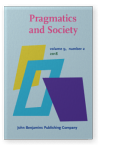Hedging in political interviewing
When Obama meets the press
This study presents an analysis of hedging strategies employed by the former president of the United States, Barack Obama, in political interviewing. Using a discourse-analytic procedure, the study investigates a corpus of 22 press interviews and verifies the presence of hedging-related discursive strategies in the President’s responses. It also identifies four specific interrelated discourse moves: ‘Reformulating the interviewer’s question’, ‘Expanding the scope of the original question sequence’, ‘Switching the time frame of the question context’, ‘Recasting the question reference from specific to general terms’. It is suggested that President Obama manages to avoid explicit responses to questions about controversial issues through hedging strategies, which shift the focus of the interviewer’s question to different interrogative formats, time frames and reference perspectives.
Article outline
- 1.Introduction
- 2.Aim
- 3.Data
- 4.Analytic framework
- 5.Example of hedging in the Obama press interviews
- 6.Analysis
- 6.1Discourse strategies
- Strategy of indetermination
- Strategy of camouflage
- Strategy of subjectivization
- Strategy of depersonalization
- Hesitation strategies
- Evasion strategies
- 6.2A cautious response style
- Reformulating the interviewer’s question
- Expanding the scope of the original question sequence
- Switching the time frame of the question context
- Time frame switch to future
- Time frame switch to past
- Recasting the question reference from specific to general terms
- 6.3Further findings
- 7.Final remarks
- Notes
-
References
References (33)
References
Aijmer, Karin and Anne-Marie Simon-Vandenbergen
2003 “
The discourse particle well and its equivalents in Swedish and Dutch.”
Linguistics 41 (6): 1123–1161.


Alonso, Rosa Alonso, María Alonso Alonso, and Laura Torrado Mariñas
2012 “
Hedging: An Exploratory Study of Pragmatic Transfer in Nonnative English Readers’ Rhetorical Preferences.”
Ibérica 231: 47–64.

Brown, Penelope, and Stephen C. Levinson
1987 Politeness: Some Universals in Language Usage. Cambridge: Cambridge University Press.


Caffi, Claudia
1999 “
On mitigation.”
Journal of Pragmatics 311: 881–909.


Caffi, Claudia
2007 Mitigation. Amsterdam: Elsevier.

Clayman, Steven E.
1992 “
Footing in the Achievement of Neutrality: The Case of News Discourse.” In
Talk at Work, ed. by
Paul Drew and
John Heritage, 163–198. Cambridge: Cambridge University Press.

Clayman, Steven E.
1993 “
Reformulating the Question: A Device for Answering/Not Answering Questions in News Interviews and Press Conferences.
Text 13 (2): 159–188.


Clayman, Steven E.
2001 “
Answers and Evasions.”
Language in Society 30 (3): 403–42.


Clemen, Gudrun
1997 “
The Concept of Hedging: Origins, Approaches and Definitions.” In
Hedging and Discourse, ed. by
Hartmut Schröder and
Raija Markkanen, 80–97. Berlin: Walter de Gruyter.


Fraser, Bruce
1975 “
Hedged Performatives”. In
Syntax and Semantics, Vol. 31, ed. by
Peter Cole and
Jerry L. Morgan, 187–210. New York: Academic Press.

Fraser, Bruce
1999 “
What are Discourse Markers?”
Journal of Pragmatics 311: 931–952.


Fraser, Bruce
2009 “
Hedging in Political Discourse: The 2007 Bush Press Conference.” In
Papers from the 2nd International Conference on Political Discourse, ed. by
Piotr Cap, 201–213. Warsaw.

Fraser, Bruce
2010 “
Pragmatic Competence: The Case of Hedging.” In
New Approaches to Hedging, ed. by
Gunther Kaltenböck,
Wiltrud Mihatsch, and
Stefan Schneider, 15–34. Bingley, UK: Emerald Group.


Hyland, Ken, and Marina Bondi
2006 Academic Discourse across Disciplines. Bern: Peter Lang.


Jucker, Andreas
1997 “
The Discourse Marker Well in the History Of English.”
English Language and Linguistics 1(1): 91–110.


Jucker, Andreas, and Sarah Smith
Kaltenböck, Gunther, Wiltrud Mihatsch, and Stefan Schneider
2010 “
Introduction.” In
New Approaches to Hedging, ed. by
Gunther Kaltenböck,
Wiltrud Mihatsch, and
Stefan Schneider, 1–14. Bingley, UK: Emerald Group.


Lakoff, George
1972 “
Hedges: A Study In Meaning Criteria and the Logic of Fuzzy Concepts.”
CLS 81: 183–228.

Martín-Butragueño, Pedro
2003 “
The Pragmatic Rhetorical Strategy of Hedging in Academic Writing.”
Vigo International Journal of Applied Linguistics 01: 57–72.

Partington, Alan
2003 The Linguistics of Political Argument: The Spin-doctor and the Wolf-pack at the White House. London: Routledge.


Prince, Ellen, Joel Frader and Charles Bosk
1982 “
On Hedging in Physician-Physician Discourse.” In
Linguistics and the Professions, Proceedings of the Second Annual Delaware Symposium on Language Studies, ed. by
Robert J. Di Pietro, 83–97. Norwood, N.J.: Ablex.

Salager-Meyer, Françoise
1994 “
Hedges and Textual Communicative Function in Medical English Written Discourse.”
English for Specific Purposes 131: 149–170.


Salager-Meyer, Françoise
1995 “
‘I think that perhaps you should’: A Study of Hedges in Written Scientific Discourse.”
The Journal of TESOL France 2 (2): 127–143.

Schiffrin, Deborah
1987 Discourse Markers. Cambridge, New York: Cambridge University Press.


Schröder, Hartmut, and Dagmar Zimmer
1997 “
Hedging Research in Pragmatics: A Bibliographical Research Guide to Hedging.” In
Hedging and Discourse. Approaches to the Analysis of a Pragmatic Phenomenon in Academic Texts, ed. by
Raija Markkanen and
Hartmut Schröder, 249–271. Berlin: Walter de Gruyter.


Smith, Sara W. and Andreas H. Jucker
Taweel, Abeer Q., Emad M. Saidat, Hussein A. Rafayah, and Ahmad M. Saidat
2011 “
Hedging in Political Discourse.”
The Linguistics Journal 5 (1): 170–196.

Weinreich, Uriel
1966 “
On the Semantic Structure of English.” In
Universals of Language, ed. by
Joseph H. Greenberg, 142–217. Cambridge, Mass.: MIT Press.

Zadeh, Lotfi A.
1965 “
Fuzzy Sets.”
Information and Control 81, 338–353.


Cited by (3)
Cited by 3 other publications
Depraetere, Ilse & Gunther Kaltenböck
2023.
Hedged Performatives in Spoken American English: A Discourse-oriented Analysis.
Journal of English Linguistics 51:3
► pp. 207 ff.

Islam, Jumayel, Robert E. Mercer, Lu Xiao & Steven High
2022.
Tension Analysis in Survivor Interviews: A Computational Approach.
Digital Studies / Le champ numérique 12:1

Nikolić, Melina & Maja Nikolić
2022.
Multiple hedging in the political interview.
Reci Beograd 14:15
► pp. 24 ff.

This list is based on CrossRef data as of 15 july 2024. Please note that it may not be complete. Sources presented here have been supplied by the respective publishers.
Any errors therein should be reported to them.
